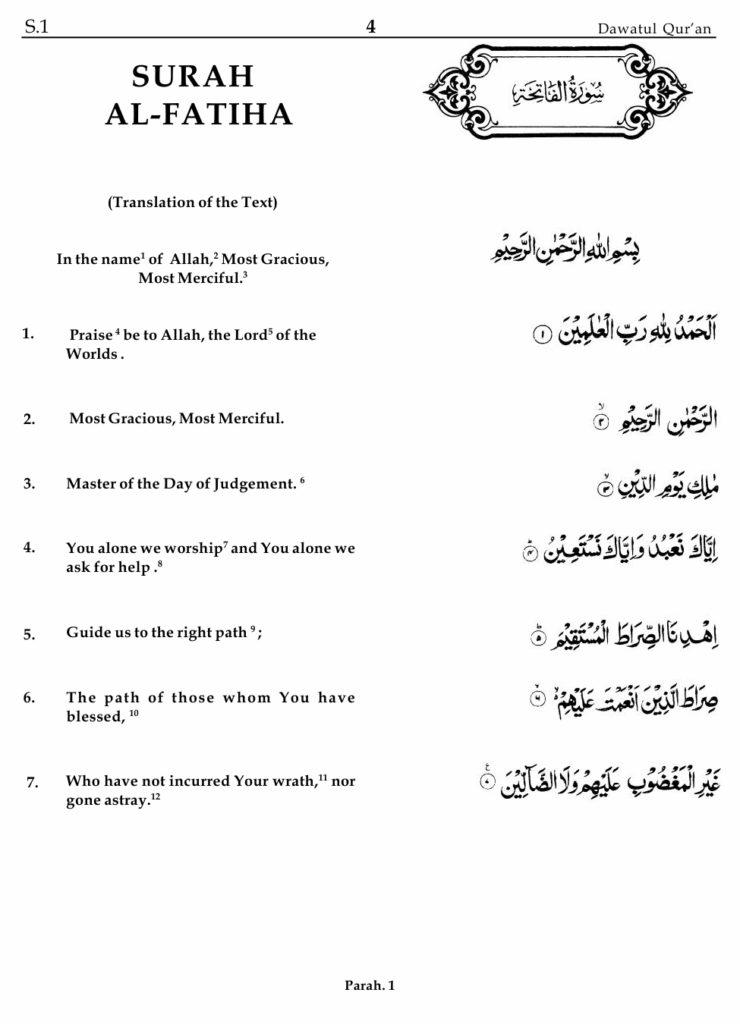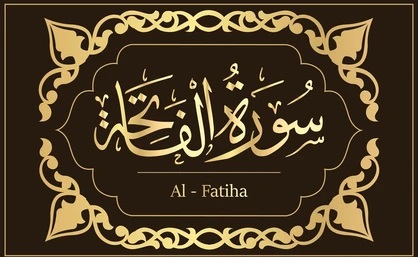Surah Al-Fatiha (The Opening)
Contents
- 1 overview
- 2 Reason for naming:
- 3 Number of verses
- 4 Number of words
- 5 Number of letters
- 6 Objectives and lessons
- 7 Content and topics
- 8 Virtues, properties and reward of recitation
- 9 Place of revelation
- 10 Time of revelation
- 11 Atmosphere of revelation
- 12 Order in the Mushaf
- 13 Relationship with the previous Surah
- 14 Feature
Surah Al-Fatihah holds a unique and paramount position in the Quran. As the opening chapter, it is recited in every prayer and encapsulates the core principles of Islam. This article explores the various facets of this profound surah, including its names, themes, virtues, and significance.
This article delves into the significance, structure, and virtues of the Fatiha, exploring its various facets and shedding light on its central role in Islamic prayer and spirituality.
بِسْمِ ٱللَّهِ ٱلرَّحْمَـٰنِ ٱلرَّحِيمِ ١ ٱلْحَمْدُ لِلَّهِ رَبِّ ٱلْعَـٰلَمِينَ ٢ ٱلرَّحْمَـٰنِ ٱلرَّحِيمِ ٣ مَـٰلِكِ يَوْمِ ٱلدِّينِ ٤ إِيَّاكَ نَعْبُدُ وَإِيَّاكَ نَسْتَعِينُ ٥ ٱهْدِنَا ٱلصِّرَٰطَ ٱلْمُسْتَقِيمَ ٦ صِرَٰطَ ٱلَّذِينَ أَنْعَمْتَ عَلَيْهِمْ غَيْرِ ٱلْمَغْضُوبِ عَلَيْهِمْ وَلَا ٱلضَّآلِّينَ ٧
In the Name of Allah—the Most Compassionate, Most Merciful [1]. All praise is for Allah—Lord of all worlds [2]. the Most Compassionate, Most Merciful [3]. Master of the Day of Judgment [4]. You ˹alone˺ we worship and You ˹alone˺ we ask for help [5]. Guide us along the Straight Path [6]. the Path of those You have blessed—not those You are displeased with, or those who are astray [7].
General meaning of the Surah: Praise, worship[1]
overview
- Surah: 1
- Number of Verses: 7
- Place of Revelation: Mecca
- Order of Revelation: 5
- Names:
- Fatihat al-Kitab (Opener of the Book)
- Fatihat al-Quran (Opener of the Quran)
- Umm al-Kitab (Mother of the Book)
- Umm al-Quran (Mother of the Quran)
- Sab’ al-Mathani (The Seven Repeated Ones)
- Quran al-Azim (The Great Quran)
- Al-Hamd (The Praise)
- Salat (Prayer)
- Shifa (Healing)
- Shafiyah (The Healer)
- Ruqyah (Incantation)
- Asas (Foundation)
- Wafiyah (The Sufficient)
- Kafiyah (The Enough)
- Kanz (Treasure)
- Shukr (Thanksgiving)
- Thana’ (Praise)
- Munajat (Supplication)
- Tafwid (Entrusting)
- Du’a (Invocation)
- Nur (Light)
- Ta’lim al-Mas’alah (Teaching the Question)
- Su’al (Question)
- Hamd Ula (The First Praise)
- Hamd Qusra (The Short Praise)[2]
- Minnah (Favor)[3]
Reason for naming:
- “Fatihat al-Kitab”: Because it is the beginning of the Quran and the teaching of the Quran and the recitation of prayer also begins with it[4].
- “Umm al-Kitab”: The Umm of everything is its origin and this Surah is also the origin of the Quran because it includes all the purposes and goals of the Quran and its sciences and wisdoms[5].
- “Sab’ al-Mathani”: Sab’ because it has seven verses and Mathani is either from Thana’ (praise) or from تثنیه (dual) because of being revealed twice or repeating it in every rak’ah and so on[6].
- “Quran al-Azim”: Ahmad narrated from Abu Hurairah that the Prophet (PBUH) described Umm al-Quran as follows: “It is Umm al-Quran and Sab’ al-Mathani and Quran al-Azim”, and the reason for this naming is that it contains what is in the Quran[7].
- “Surah Hamd and Surah Shukr and Surah Thana'”: Because it begins with praise, thanks and glorification of God.
- “Surah Salat”: Because the correctness of prayer depends on it[8].
- “Surah Namaz”: Due to the hadith Qudsi which says: “I divided the prayer between Myself and My servant into two halves…” meaning the Surah. Mursi says: Because this Surah is one of the necessities of prayer, which is from the chapter of naming something by the name of its necessity[9].
- “Surah Shifa, Surah Shafiyah, Surah Ruqyah”: Due to the narrations of the properties of this Surah.
- “Surah Asas”: Because it is the origin of the Quran and its first Surah[10].
- “Surah Wafiyah”: It is stated in Kashshaf that Sufyan ibn Uyainah used to call it by this name because all the meanings of the Quran are fulfilled in it. And Tha’labi said because every Surah can be divided into two halves in prayer, half in one rak’ah and half in another rak’ah except this Surah which cannot be halved, and Mursi said because it has gathered what is for God and what is for the servant[11].
- “Surah Kafiyah”: Because it suffices in prayer from other than itself, but nothing from other Surahs suffices from i[12]t.
- “Surah Kanz”: Because of a narration from Ali (AS) who said: “Surah Fatiha was revealed from the treasure under God’s Throne.”[13]
- “Surah Munajat”: Due to the mention of the servant’s supplication with his Lord in this Surah which says: (إِيَّاكَ نَعْبُدُ وَ إِيَّاكَ نَسْتَعِينُ)[14]
- “Surah Tafwid”: Tafwid is entrusting the matter to God; because it includes [15](إِيَّاكَ نَعْبُدُ وَ إِيَّاكَ نَسْتَعِينُ)
- “Surah Du’a”: Because we pray in “Guide Us” (اهدنا)[16]
- “Surah Nur”: The Holy Quran refers to the heavenly books with the expression of light[17] and considers their goal to be enlightening people, therefore, the Surah which is the essence of the book of light[18], is itself a bright light and enlightener of people.[19]
- “Surah Ta’lim al-Mas’alah”: Because it contains the etiquette of asking and requesting from God, which begins with praising God before asking.[20]
- “Surah Su’al”: Because of the words of prayer and asking from God Almighty.[21]
- “Surah Hamd Ula and Surah Hamd Qusra”: The naming of the Surah with these two names is because among the Surahs of praise, the first and shortest Surah is Hamd.[22]
- “Surah Minnah”: Because of the tone of God’s saying which says: “We gave you Sab’ al-Mathani and the Great Quran”.[23]

Number of verses
Surah Al-Fatiha has seven verses.[24]
Number of words
Surah Al-Fatiha has (25) twenty-five words[25]. (It should be noted that the opinions on the number of words of the Surahs are different)
Number of letters
Surah Al-Fatiha has (123) one hundred and twenty-three letters[26]. (It should be noted that the opinions on the number of letters of the Surahs are different)
Objectives and lessons
The general purposes and objectives of Surah Al-Fatiha are:
- Stating the basic principles of religion, namely monotheism, prophethood and resurrection;
- Expressing need, love and prayer; the beginning of this Surah is praise, the middle is sincerity and the end is direct prayer with God, and a kind of teaching of speaking directly with Him.[27]
Content and topics
Each of the seven verses in Surah Al-Fatiha refers to an important point:
- In the Name of Allah بِسْمِ اللَّهِ: It is the beginning of every work, and it teaches us to seek help from the pure essence of God when starting any work.
- All praise is for Allah—Lord of all worlds الْحَمْدُ لِلَّهِ رَبِّ الْعالَمِينَ: It is a lesson of returning all blessings and nurturing of all creatures to Allah, and paying attention to the fact that all these blessings originate from His pure essence.
- The Most Compassionate, Most Merciful, الرَّحْمنِ الرَّحِيمِ: This states that the basis of His creation, nurturing and sovereignty is based on mercy and compassion, and the main axis of the world’s nurturing system is this principle.
- مالِكِ يَوْمِ الدِّينِ Master of the Day of Judgment : It is an attention to the resurrection, and the abode of reward for deeds, and God’s sovereignty over that great court.
- إِيَّاكَ نَعْبُدُ وَ إِيَّاكَ نَسْتَعِينُ You ˹alone˺ we worship and You ˹alone˺ we ask for help: It expresses monotheism in worship and monotheism in the point of reliance of human beings.
- اهْدِنَا الصِّراطَ الْم مُسْتَقِيمَ Guide us along the Straight Path,: It indicates the need and love of servants for the issue of guidance and is also an attention to the fact that all guidance is from Him.
Finally, the last verse of this Surah is a clear and bright depiction of the straight path, the path of those who have been included in His blessings, and is separate from the path of the wrathful and misguided.[28]
Virtues, properties and reward of recitation
It has been narrated from the Holy Prophet (PBUH) that he said: “Whoever recites Surah Fatihat al-Kitab, he will be rewarded as if he has recited two-thirds of the Quran and has given charity to every believer, male and female.”
The same meaning has been narrated from the Prophet (PBUH) with a different chain of transmission, with the difference that it is as if he has recited the entire Quran. It has been narrated from Ubayy ibn Ka’b that he said: I recited Surah Fatiha to the Messenger of Allah (PBUH) and he said: “By the One in whose hand my soul is, there is nothing like this Surah in the Torah, the Gospel, the Psalms and even in the Quran itself.”
This Surah is “Umm al-Kitab” and “Sab’ al-Mathani” and this Surah is divided between God and His servant and for the servant is whatever he wants. Muhammad ibn Mas’ud Ayashi narrates that the Messenger of Allah (PBUH) said to Jabir: “O Jabir, shall I teach you the best Surah that God has revealed in His book?” Jabir said: Yes, may my father and mother be sacrificed for you, O Messenger of Allah, teach me. So the Messenger of Allah taught him Surah Al-Fatiha which is Umm al-Kitab, then he said: “O Jabir, would you like me to tell you about its virtue?” He said: Yes, may my father and mother be sacrificed for you. The Prophet (PBUH) said: “This Surah is a cure for every pain and illness except death.”
It has been narrated from Imam Sadiq (AS) that he said: “Whoever is not cured by Hamd, nothing will cure him.”
Amir al-Mu’minin narrates from the Messenger of Allah that God said to me: “وَ لَقَدْ آتَيْناكَ سَبْعاً مِنَ الْمَثانِی وَ الْقُرْآنَ الْعَظِيمَ”[29] (O Muhammad, We have indeed given you seven verses with praise and the great Quran). The Prophet (PBUH) says: God placed Surah Al-Fatiha against the entire Quran and bestowed upon me the favor of revealing it especially to me, then He said: Fatihat al-Kitab is the most honorable thing that is in the treasures of the Throne. God honored Muhammad with it and did not make any of the prophets his partner in this regard. Except Solomon who was given (Bismillah….) from this Surah. As the Quran narrates from the tongue of Bilqis: “إِنِّی أُلْقِی إِلَی كِتابٌ كَرِيمٌ إِنَّهُ مِنْ سُلَيْمانَ وَ إِنَّهُ بِسْمِ اللَّهِ الرَّحْمنِ الرَّحِيمِ” (A noble letter has been given to me from Solomon and it is in the name of God, the Most Gracious, the Most Merciful).
Then he said: Whoever recites it while believing in the friendship of Muhammad and his family and believing in its ظاهر (apparent meaning) and باطن (hidden meaning) and following his command, God will give him a good deed for every letter of it, each of which is higher than the world with all its wealth and goodness. And if someone listens to this Surah which is being recited, he will have one-third of the reward and merit of reciting it. Take this thing as a gain and increase it so that its time does not pass and you do not have regret and sigh in your heart.[30]
Place of revelation
Surah Al-Fatiha, according to Ibn Abbas and Qatada, is Meccan, and according to Mujahid, it is Medinan, and some believe that it was revealed once in Mecca and another time in Medina.[31]
Time of revelation
Considering that Surah Al-Fatiha is among the first revealed Surahs, therefore, the time of its revelation is in the first year of the prophethood of the Prophet of Islam (PBUH).
Atmosphere of revelation
At the beginning of the mission of the Prophet of Islam (PBUH), when the Quran was gradually being revealed, like any complete and comprehensive book, it needed to be introduced and its content explained so that its lofty goals would be مشخص (clear). God, at the beginning of His book, has summarized the lofty knowledge of this book and since the general goal of the revelation of the Quran is the guidance of human beings, this important point has also been given importance in this Surah.
Order in the Mushaf
Surah Al-Fatiha is the first Surah of the Quran in the current order.[32]
Order based on revelation
Surah Al-Fatiha is the fifth revealed Surah of the Quran and it was revealed after Surah Al-Muddathir.[33] (It should be noted that the opinions on the order of revelation of the Surahs of the Quran are different)
Relationship with the previous Surah
Surah Al-Fatiha does not have a previous Surah.
Feature
Surah Al-Fatiha has a distinct position among the Surahs of the Quran and the following are the unique features of this Surah:
- The recitation of Surah Al-Fatiha is obligatory in all prayers and without it, prayer is not valid. It has been narrated from the Prophet of Islam (PBUH) that he said: “لا صلاة الّا بفاتحة الکتاب” “ there is no prayer without the opener of the Quran”[34] and in some expressions he has said: “لا صلاة لمن لم يقرأ بفاتحة الكتاب” There is no prayer for the one who does not recite Fatihat al-Kitab (the Opening of the Book).”[35]
- The first complete Surah that was revealed to the Prophet (PBUH) is Surah Al-Fatiha.[36]
- This Surah, with its features, according to the narrations from the Prophet (PBUH) and Ahl al-Bayt (AS), is the best Surah of the Quran.[37]
- It is a Surah that is divided between God and His servants.[38]
- This Surah is fundamentally different from other Surahs of the Quran in terms of tone and melody because other Surahs are all as the word of God, but this Surah is from the tongue of the servants, and in other words, in this Surah, God has taught His servants how to supplicate and speak with Him.[39]
- Surah Al-Fatiha is the foundation of the Quran; Ibn Abbas, the famous Islamic commentator, says: “ان لكل شى ء اساسا … و اساس القرآن الفاتحة” “Everything has a foundation… and the foundation of the Quran is Al-Fatiha”.[40]
- Surah Al-Fatiha was introduced as a great blessing to the Prophet (PBUH), and it has been placed against the entire Quran, where it says وَ لَقَدْ آتَيْناكَ سَبْعاً مِنَ الْمَثانِی وَ الْقُرْآنَ الْعَظِيمَ: “We have indeed given you seven verses that are repeated and the great Quran” (Surah Al-Hijr, verse 87).[41]
- In Islamic hadiths, in Shia and Sunni sources, emphasis has been placed on the recitation of Surah Al-Fatiha, its recitation gives spirit and faith to a person, brings him closer to God, creates purity of heart and spirituality, strengthens a person’s will and increases his efforts in the way of God and creation, and creates distance between him and sin and deviation.[42]
- All the Surahs of the Quran are the word of God and their address is usually to the people, but the tone of Surah Al-Fatiha is from the tongue of the people and addressed to God; that is, the Holy Quran has taught people how to supplicate and speak with God in this Surah.[43]
- This Surah is one of the five Surahs that begin with the phrase “الحمدلله”. These Surahs are Fatiha, An’am, Kahf, Saba, Fatir, all of which are among the Meccan Surahs.
- Discussion about saying Amin after reciting Fatiha: The Ahl al-Sunnah believe that the word Amin after Fatiha is مستحب (recommended)[44], but the Imamiyyah do not consider it permissible, rather they consider it Bid’ah (innovation) and forbidden and invalidates prayer.[45]
[1] قاموس قرآن، ج 2، ص: 172 – Quran Dictionary, Volume 2, Page 172
[2] ترجمۀ الإتقان فى علومالقرآن، ج 1، ص 189 – 193 – Translation of al-Itqan fi Ulum al-Quran, Volume 1, Pages 189-193 – This refers to a translation of a classical work on Quranic sciences by Jalal al-Din al-Suyuti.
[3] تبصير الرحمن و تيسير المنان، ج 1، ص 9 – Tabsir al-Rahman wa Taysir al-Mannan, Volume 1, Page 9
[4] ترجمۀ الإتقان فى علومالقرآن، ج 1، ص 189 – Same as [2], but specifically page 189.
[5] Ibid., Page 190
[6] Ibid.
[7] Ibid.
[8] Ibid, Page 191
[9] Ibid.
[10] Ibid, Page 191
[11] Ibid.
[12] Ibid.
[13]تبصير الرحمن و تيسير المنان، ج 19 – Tabsir al-Rahman wa Taysir al-Mannan, Volume 1, Page 9
[14]ترجمۀ الإتقان فی علوم القرآن، ج 1، ص 192 – Same as [8].
[15] Ibid.
[16] Ibid.
[17] Surah Al-Ma’idah, Verse 44
[18] Surah Ibrahim, Verse 1
[19] Tafsir Tasnim, Volume 1, Page 259
[20] Ibid., quoted from Mursi
[21] Same as [8]
[22] Same as [19].
[23] Same as [3]
[24] Al-Tafsir al-Kabir: Tafsir al-Quran al-Azim (al-Tabarani), Volume 1, Page 113
[25] Ibid
[26] Ibid
[27] Tafsir Quran Mehr, Volume 1, Page 124
[28] Tafsir Nemuneh, Volume 1, Pages 6-7
[29] Surah Al-Hijr, Verse 87
[30] Majma’ al-Bayan, Volume 1, Pages 34 and 35
[31] Ibid., Page 33
[32] Same as [27], but page 123.
[33] Al-Tamhid fi Ulum al-Quran, Volume 1, Page 136
[34] Awali al-Lali, Volume 3, Page 83
[35] Ibid., Volume 1, Page 196
[36] Same as [33], but page 143.
[37] Same as [28], but page 3.
[38] Same as [30], but page 88.
[39] Same as [28], but page 2.
[40] Ibid., Volume 1, Page 4
[41] Ibid., Volume 1, Page 5
[42] Same as above.
[43] Same as [27].
[44] This lists three different sources: *Anwar al-Tanzil wa Asrar al-Ta’wil, Volume 1, Page 32. *Al-Jami’ li Ahkam al-Quran, Volume 1, Page 129. * “Al-Durr al-Manthur fi Tafsir al-Ma’thur, Volume 1, Page 16.
[45] * Al-Faqih (by al-Saduq), Volume 1, Page 390 – A Shia book of jurisprudence. *Al-Muqni’ah (by Shaykh al-Mufid), Page 105 – Another Shia book of jurisprudence. *Tafsir Kanz al-Daqaiq wa Bahr al-Ghara’ib, Volume 1, Page 87 – A Quranic commentary.



